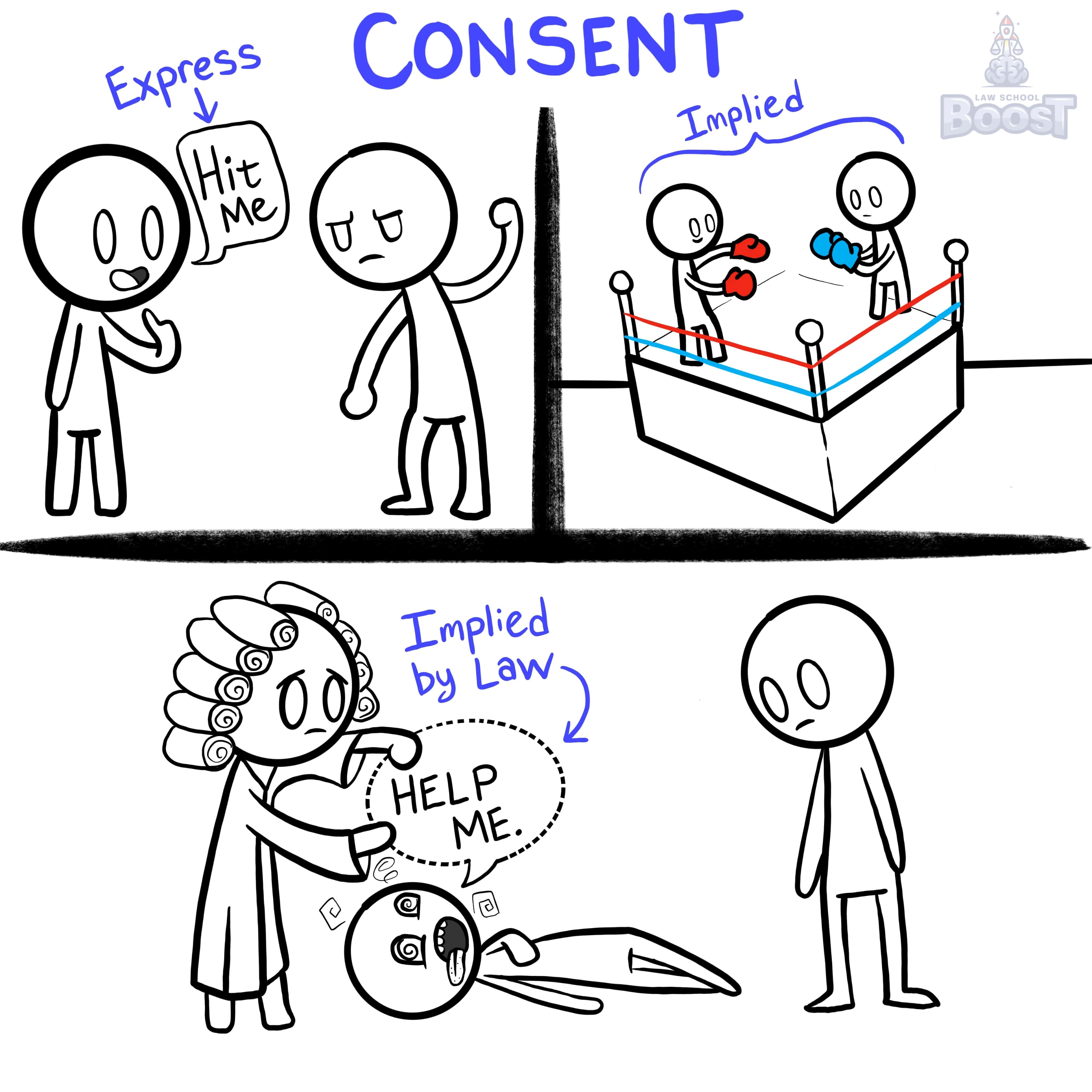👀
Torts • Defenses to Intentional Torts
TORT#011
Legal Definition
Valid consent can be either express, implied, or implied by law. People cannot consent to a criminal act. Further, a defendant can exceed the scope of consent given, thereby incurring liability.
Plain English Explanation
Whenever you see someone commit an intentional tort, you should look to see if they may have a valid defense. Consent is a valid defense.
Put simply, people can consent to all sorts of things. For example, when professional boxers fight, they are constantly committing harmful, offensive contact with their opponent. Every strike is a battery. However, each fighter has consented to being struck by the other as a result of the nature of their profession. If one boxer ever sued another boxer for punching them in the face during a fight, a valid defense would be as simple as, "Yeah, I punched him. But, in my defense, he consented to it by agreeing to box with me that night."
There are, of course, limitations to consent. One is that people cannot consent to criminal acts. For example, if Sam agrees to let Bob burn down his house, when Bob is later arrested for arson, he can't say, "It's cool, Sam said I could." Likewise, if Sam asks Bob to kill him, "He asked me to" will not be a valid defense for Bob during his murder trial.
Another limitation is that the scope of consent may be limited and, where a defendant goes beyond that scope, he will be liable. For example, when a salesman visits your home and you consent to letting them inside to speak to you, they do not have permission to wander around your home. Likewise, a business consents to allow you to enter their premises to do business, but you may still trespass if you exceed the scope of their consent by walking into an employee-only area.
Put simply, people can consent to all sorts of things. For example, when professional boxers fight, they are constantly committing harmful, offensive contact with their opponent. Every strike is a battery. However, each fighter has consented to being struck by the other as a result of the nature of their profession. If one boxer ever sued another boxer for punching them in the face during a fight, a valid defense would be as simple as, "Yeah, I punched him. But, in my defense, he consented to it by agreeing to box with me that night."
There are, of course, limitations to consent. One is that people cannot consent to criminal acts. For example, if Sam agrees to let Bob burn down his house, when Bob is later arrested for arson, he can't say, "It's cool, Sam said I could." Likewise, if Sam asks Bob to kill him, "He asked me to" will not be a valid defense for Bob during his murder trial.
Another limitation is that the scope of consent may be limited and, where a defendant goes beyond that scope, he will be liable. For example, when a salesman visits your home and you consent to letting them inside to speak to you, they do not have permission to wander around your home. Likewise, a business consents to allow you to enter their premises to do business, but you may still trespass if you exceed the scope of their consent by walking into an employee-only area.
Hypothetical
Hypo 1: Bob and Sam agree to a boxing match for charity. Midway through the match, Bob kicks Sam in the head, causing a concussion. Result: Though Bob and Sam consented to a physically brutal boxing match, kicking exceeds the scope of the consent. As such, Bob has no valid defense for his battery against Sam.
Visual Aids

Related Concepts
In assessing a tort against property, what is a private necessity?
In assessing a tort against property, what is a public necessity?
In assessing a tort against property, what is necessity?
What is the shopkeeper's privilege?
When is consent implied?
When is consent implied by law?
When is defense of others proper?
When is defense of property proper?
When is express consent not valid?
When is self-defense proper?
When may an actor recapture a chattel?


